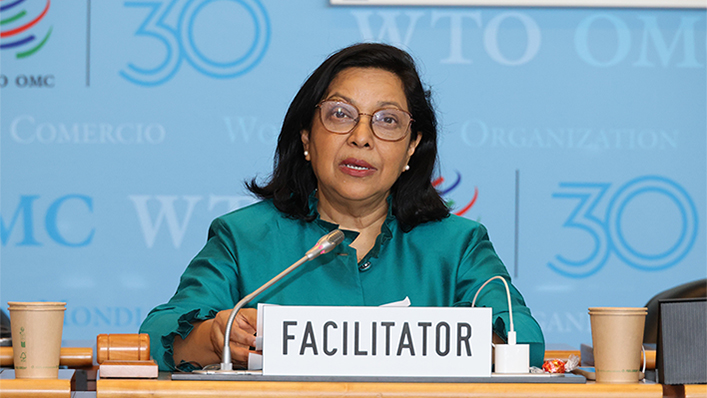
“We know what we need to do,” Ambassador Dwarka-Canabady told a Heads of Delegation meeting, the third convened since the formal dispute settlement reform process was launched earlier this year. “We know we have to accelerate work. We need to find the best way of doing that to keep the process inclusive.”
Based on the readouts of the co-convenors on their technical discussions, the facilitator said a number of elements of convergence have emerged on the issue of accessibility but that appeal/review might take a bit more time.
“Members seem to be generally satisfied that the process has been inclusive and transparent,” Ambassador Dwarka-Canabady said. “But we need to accelerate the discussions because we need to start thinking about the timeline for delivery.”
At their 12th Ministerial Conference (MC12) in June 2022, WTO members agreed to conduct discussions with the view to having a fully and well-functioning dispute settlement system accessible to all members by 2024. That commitment was reaffirmed by members at MC13 earlier this year.
Ambassador Dwarka-Canabady was appointed as facilitator in April, thus signalling the formalization of the dispute settlement reform process. Six co-convenors were appointed to assist the facilitator in the process.
In her report, Ambassador Dwarka-Canabady noted she has held regular meetings with the co-convenors to coordinate work, to understand where members are in the various subjects discussed, and to determine what needs to be done to facilitate the process. During these conversations, she reiterated the importance of ensuring members’ effective participation in all reform discussions, regardless of size of delegation.
“We need to ensure that all members feel heard and are comfortable with the process,” she said.
In addition to holding monthly meetings at Heads of Delegation level, the facilitator has encouraged the co-convenors to hold periodic meetings among experts and capital officials, including with virtual participation.
Reporting for the co-convenors, Ms Jessica Dickerson (Australia) said that the first technical-level transparency meeting on appeal/review and accessibility with capital-based officials was held on 11 July, with technical meetings on appeal/review taking place on 9 and 15 July and on accessibility on 21 June and 4 July. A second transparency meeting will take place on 19 July.
Ms Dickerson noted that, in response to the facilitator’s request to increase the pace of discussions, the co-convenors will circulate to members a new draft technical work plan for the period September through December 2024.
On the specific issue of appeal/review, Ms Dickerson noted that since the last update to members, the technical experts have discussed the following sub-topics:
- Reducing or changing incentives to appeal;
- Clarifying members’ expectations of adjudicators;
- Form of the mechanism; and
- Access to the mechanism.
With experts now having had a first discussion on all six sub-topics, the co-convenors on appeal/review now feel the time is right to prepare a document outlining the topics and reform ideas currently under discussion, Ms Dickerson said. A draft will be shared with members before discussions resume in September which the co-convenors anticipate will be useful for structuring future discussions, assisting Geneva-based delegates to keep their capitals updated, and for demonstrating progress.
Reporting on the co-convenor discussions related to accessibility, Mr David Stranger-Jones (United Kingdom) said the two technical sessions in this issue saw many developing economy and least developed country delegations speak and be heard at these sessions, especially those who did not attend or did not actively participate in the previous informal process. The co-convenors on accessibility have also held open, informal consultations to discuss both the process and substance of the work, with 23 delegations representing approximately two-thirds of the membership offering their views.
Of the six sub-topics addressed in the technical sessions under the accessibility heading, a significant amount of time was spent discussing the first sub-topic on the meaning of accessibility, recognising that there were many delegations — and delegates — who were new to the process, Mr Stranger-Jones said. The majority of discussions — and interests and concerns — were articulated around the sub-topics of capacity building, technical assistance, and litigation costs, which were the focus of the second technical session. He also noted a clear call from many members to look at what has been already reflected in the draft consolidated text from the informal process, as the interests expressed in relation to accessibility have been largely discussed and reflected there.
Around 20 delegations took the floor to comment after the reports of the co-convenors, some speaking on behalf of groups of members.
Ambassador Dwarka-Canabady proposed, and members accepted, her suggestion that the next scheduled Heads of Delegation meeting on dispute settlement reform in September be skipped in order to give the technical experts more time to engage in substantive work. The next Heads of Delegation meeting on dispute settlement reform is now scheduled for 17 October.
Share
Reach us to explore global export and import deals